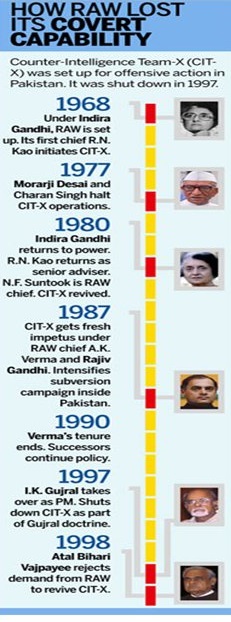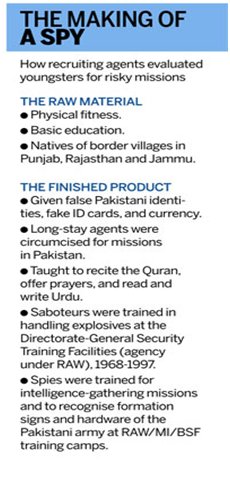Research and Analysis Wing (RAW)
This is a collection of articles archived for the excellence of their content. |
Appointment of Secretary, 2016
The Indian Express, December 18, 2016
Rajiv Jain to be new IB chief, Anil Dhasmana to head RAW
The Centre appointed Balochistan expert and 1981-batch Madhya Pradesh cadre IPS officer Anil Dhasmana as Secretary of Research and Analysis Wing and 1980-batch Jharkhand cadre IPS officer Rajiv Jain as the Director of Intelligence Bureau.
As reported earlier by The Sunday Standard, Dhasmana will take over the reins of the Research and Analysis Wing from the outgoing chief Rajinder Khanna whose tenure comes to an end on December 31. RAW is the external Intelligence of the country and its chief is designated as Secretary, Research, Cabinet Secretariat.
Dhasmana was scheduled to retire on December 31 but with this appointment, he will have a fixed tenure of two more years in the key agency.
Dhasmana, originally an IPS officer merged his cadre with the Research and Analysis Service. He has served with the RAW for the last 23 years and was presently Special Secretary in the agency. He has served with the RAW in major desks including London, Frankfurt and Pakistan.
Both the top posts carry a fixed tenure of two years from the date of joining. Both the appointees will take over the charge of their respective top posts on January 1.
Jain is a recipient of President's Police Medal and has served in various capacities in the agency including the sensitive Kashmir desk.
Jain was advisor to the previous NDA government's interlocutor on Kashmir K C Pant when talks were held with Kashmiri separatist leaders.
Cathy Scott-Clark and Adrian Levy’s 2021 book
RAW vis-à-vis ISI: An overview
August 15, 2021: The Times of India
RAW and ISI are usually seen as less effective than their Western counterparts. Is this true or a cultivated cover?
Having spent many years observing both, it would be fair to say that both RAW and ISI are ruthless, disciplined and engaged in everything one associates with a spy agency — including recruiting liars, killers, cheats, knitting together the impossible and unlikely, manipulating local and international conditions, gathering and analysing data. A lot of spying — contrary to the movies — is also drudge work. The image of RAW is both cultivated but also a default as a draconian secrecy cloaks India, whereas ISI has never had to answer to the people, as they are underpinned by a military that prefers its own company, and fears exposure.
What has been RAW’s biggest success?
Apart from projecting itself as a victim, RAW’s soft power is stellar, working around the world in tandem with the diaspora and the MEA to sell a story of India and denigrate Pakistan.
While India has been a real victim of terror and insurgency, much of which was fuelled by Pakistan, this is not the whole story. India is the protagonist too — or if you prefer, India is also “the one who knocks”, to steal a line from Walter White and Breaking Bad.
RAW often wins, especially in the narrative control game. It works with the diaspora to reap the rewards of its connections to global finance, tech, and political science. RAW also wins diplomatically. It won over China to defeat Jaish and Masood Azhar at the UN where he was proscribed as a terrorist. It wins over Pakistan in the perception wars, with the exception of post-Balakot where ISI took the high ground by handing back its pilot ‘prisoner of war’.
You indicate that India had prior knowledge about the 26/11 attacks?
Indian intelligence, collectively, had access to an enormous amount of live intelligence inside Lashkar-e-Taiba, and had been following in real time the growth of a maritime operation targeting Mumbai but why this penetration and its feed did not gain traction is something you’d have to ask RAW about.
There have been several infamous cases when RAW officials like Unnikrishan and Rabinder Singh were discovered as double agents. Red flags were ignored because the agents had powerful patronage. Have things changed?
All intelligence outfits are penetrated — the UK and US know this well. So RAW officers have been suborned or flipped, entrapped or ambushed, lured by sex, power and cash. RAW has also had to contend with the national psyche. India, profoundly non-aligned but also pacifist for many years, never really got behind the idea of RAW.
It was frequently poorly funded, and not backed by governments, which cut it adrift. Through this process of being loved and unloved, of being led but never allowed to lead, of failing to be chartered or provided with a constitutional role, RAW did calcify. It could not escape its police roots and its rigid promotional structures, however well its hard-working ingenious officers performed. This left it out of the running — globally, or marginalised in terms of languages, analyses, and tech, especially AI etc.
Whereas foreign intelligence elsewhere is looking to become like the societies around it, recruiting widely from them, RAW has become ideological with a recruiting pool that has not responded to faith, caste, class and linguistic challenges. It looks more like a version of 80s India told by foreigners than the agile new millennium. And we believe it is being kept like this, as is the police, so that they can be controlled for political dogfights. This transcends governments, and so it would be wrong to characterise this as simply a BJP innovation post-2014. Governments of all colours in previous years have had the chance to make dramatic changes but have bottled it.
You write that Kulbhushan Jadhav, languishing in a Pakistani jail since 2016, has become part of a tug of war between India and Pakistan. What’s your take on Jadhav?
Intelligence sources suggest Jadhav was likely an asset and not an officer, a source in the right location, able to traverse a deadly corridor between Iran, Karachi and India, who became desirable after 26/11 when intel needed new sources. Jadhav might have passed on tidbits that he heard and saw to India. Pakistan, in a classic intel operation, did not capture him but let him roam, tracking him, actively trying to grow this minnow into a whale, which it would then harpoon. This is the world of intelligence. Jadhav, Pakistan’s spies claim, was handed plans for an airbase in Pakistan, and as soon as he accepted them he became what ISI wanted him to be. India, some sources say, left him to dangle, neither protecting him nor training him, but hoping for the best. Whatever you believe, a married man with children in Mumbai, is now collateral seeking a Bridge of Spies trade. These versions which go far deeper are set out in the book.

